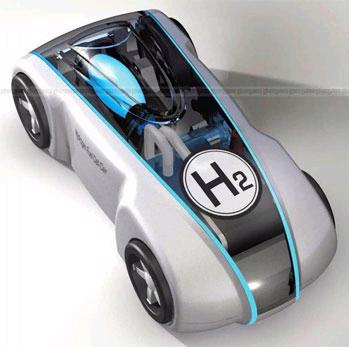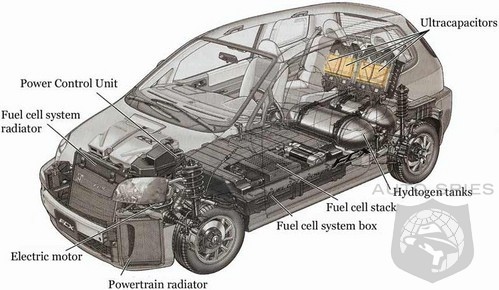As the world’s fossil fuels are continuously depleted with increasing use we run the risk of facing a shortage soon enough in the future. Alternatives are a must as we already face the heat here in India with capping of LPG cylinders. One of the biggest consumers of fossil fuels are petroleum-based vehicles. Whether it is a diesel car or a petrol car or a CNG vehicle it doesn't really matter. They all use fossil fuels which are bound to run out one day or the other. We need to continuously improve current efficiencies of transportation vehicles while still improving on alternative energy sources. One of the biggest solutions to alternative energy solutions are using hydrogen instead of carbon based fuel as an energy source.

Hydrogen as a fuel has a lot of potential to be used as energy because it not only releases a large amount of energy when burnt but it also prevents the release of toxic fumes as pollutants.
Let’s do a little bit of math shall we?
I promise it won't be too large.
Bond energies of hydrogen
The bond energy of the hydrogen bond is 103 kcal/mole. And the bond energy of the hydrogen oxygen bond is 110 kcal/mole. Also the oxygen molecule has 116 kcal/mole of energy.
Therefore the energy released on formation of the water molecule requires breaking one oxygen molecule and two hydrogen molecules first.
That would mean the energy required = 2 x 103 + 116 = 322 kcal/mole
But when water is formed the energy released is = 4 x 110 = 440 kcal/mole
Hence the net energy gain = 440 - 322 = 118 kcal/mole
And this simple math shows the huge amount of energy which is gained on burning hydrogen as a fuel. If a human being were to be powered up by a hydrogen engine he would run 52 miles on just 1 litre! Hydrogen based cars can theoretically provide mileage as good as 93 miles per gallon which is still much better than gasoline based cars providing 35 miles per gallon.
Yes and that’s exactly why hydrogen is a potential energy alternative.

This picture shows exactly what the components of the hydrogen economy consist of.I won't talk about all the boring points in detail but only some of the parts which are really interesting.
Production and delivery
Hydrogen has a huge source in the form of our vast oceans and seas which provide an ample source of hydrogen. The problem is converting the water to hydrogen which requires energy in the first place.
Well right now they use natural gas and other petroleum products as well as biogas to produce hydrogen. Yes production is actually the biggest hurdle to the hydrogen economy. Hydrogen requires huge amounts of energy to be produced.(It only makes sense since it produces a huge amount of energy on combustion as well.) People are actively working on getting hydrogen to be obtained from a safe source. There are many technologies like aluminium based production (still waiting to be patented) for effective hydrogen production.
And yes there are several hoaxes doing the rounds around the internet which claim to have made super efficient methods to obtain hydrogen from water and hence make cars that run miles on just plain water!!! Well NASA itself has yet to make such a breakthrough but of course there is no giving up hope as people are still trying.
Although I am optimistic that this can be effectively taken care of using solar , wind , hydel power and various other renewable energy sources(like i told you before the future depends on all energy renewables working together) Then the hydrogen can be transported using storage tanks to fuel stations where the vehicles can refill their tanks!
And no I am not talking about science fiction. This is reality as industries work to implement these systems into the current economy.
Fuel cells
This is the talk of the town when it comes to hydrogen based economy. Fuel cells use a continuous supply of hydrogen to be directly converted to energy using a chemical reaction. This means efficiencies are quite high when using a fuel cell to power up a vehicle as compared to using internal combustion engines to power up a car.
There is huge money in the R&D for fuel cells in the automobile sector.There have been lots of hydrogen based fuel cells which are running commercially as well. Although there has been electric vehicles which have been shown to have much higher efficiencies they lack the power or speed pick up of fuel cell based cars and car maniacs out there swear by top speeds and revving pick up.

Storage
Now this is a real tricky issue hydrogen is the lightest of all elements out there and it is easily the least dense of all gases. In fact 1 gram of hydrogen would occupy as much as 22.4 litres! that too at 0 degrees celsius. Not too good when considering that we would need more than that to provide decent mileage to the vehicles. Well scientists have been looking for ways to combat this dilemma.
One of the ways include in-situ production of hydrogen.
It means the hydrogen would not be carried directly as a fuel. Instead hydrogen containing compounds would be used to generate the hydrogen at the time of running the car. However this method reduces efficiency significantly and renders the use of the vehicle as useless!
Another one of the methods include storage of hydrogen in a really efficient way
This means nanotechnology again! Yes the use of carbon nanotubes to store hydrogen has been deemed a potentially powerful method to store huge quantities of hydrogen in the vehicles. That however is a costly method and current research includes making hydrogen storage even cheaper.
Safety?
Now this is a bit of a tricky issue because hydrogen is even more susceptible to combustion than petroleum. Although that also means that fires breaking out won’t produce toxic fumes but then again they will bring out a bigger bang if they accidentally catch fire. Also current hydrogen storage techniques are not exactly 100% leak proof which means the dangers of accidents are higher! However this can be offset by using standards and protocols to enhance the safety factor of using hydrogen.
So what’s the real problem in implementation of hydrogen as a potential energy source?
Well this again lies in costs. Changing equipment and technology that has been built on petroleum will cost huge amounts and also current petroleum-based vehicles and fuel rates are cheaper than those of hydrogen based ones. Of course this should rapidly change in the very close future. In fact there are many companies already that provide hydrogen cars and hydrogen refuelling outlets.



Yes these are real hydrogen cars in the market out there.

No comments:
Post a Comment
Do not spam. Spammers will be banned from this site